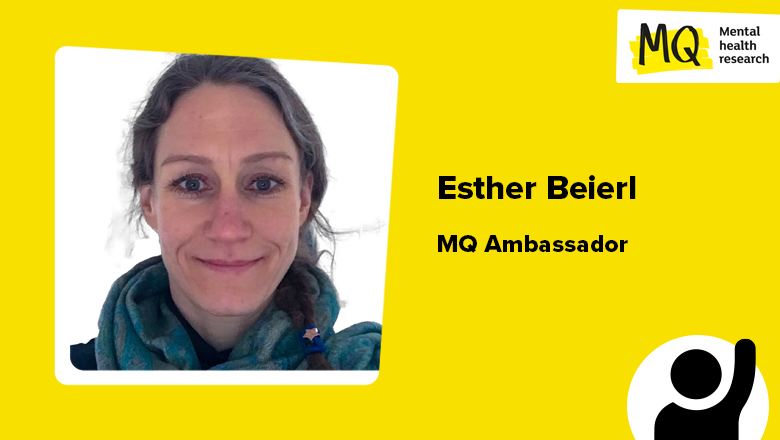[ad_1]
In a series of profiles, we at MQ Mental Health Research would like to introduce to you some of our wonderful MQ Ambassadors. These are the individuals who support our charity organisation and lend their voices of lived experience expertise of mental illness.
MQ Ambassador Esther Beierl, who is also a data scientist, psychometrician, and postdoctoral researcher in mental health at Oxford and Cambridge University, chatted to us to share her experience of mental health conditions and why she became interested in MQ Mental Health Research.
Esther, thank you so much for chatting with us. Firstly, could you give us a summary of your experience with mental health?
I have both, research and lived experience in mental health regarding several conditions. I am a highly sensitive person, which causes me to experience some neurodivergent traits, as well.
When it comes to public perception, what stigma have you faced?
In my experience a common and devastating misconception is that mental health challenges do not happen to people who (are able to) present themselves as highly functional, or who (make an effort to) appear as if they were fine.
Related to that, some of the most hurtful stigmas and misconceptions that I’ve encountered include:
- ‘You can’t be suffering that badly from your mental health conditions, you are highly functioning.’
- ‘You can’t be highly intelligent, otherwise you wouldn’t have developed these mental health conditions.’
- ‘You have never been able to recover, because you must have used the treatment techniques incorrectly.’
- ‘You can’t be severely unwell – you look fine.’
- ‘You don’t recover because you simply don’t want to recover.’
- ‘You are not highly intelligent, you have [insert condition x], that’s why you think you are special.’
Despite of all the issues that mental health diversity might cause for the individual and the collective, we need to keep in mind that people like me, or rather “us”, are high performers and probably even because of our mental health diversities we are very adaptable and therefore employable.
Who has helped you the most with your mental health experience?
Body-based approaches, such as yoga and resistance training, and working together with my therapist using personalised and eclectic treatment approaches have helped both my physical and mental health tremendously.
I am physically and mentally stronger, healthier, and happier than I’ve even been, although I still live with some of the diagnoses. Being highly sensitive means that I will need to take care of my specific needs in that sense for the rest of my life to maintain my well-being.
What lessons have you learned from your mental illness experience?
I had to learn the hard way to articulate my needs as well as set and maintain boundaries. Acknowledging what and who drains my energy and what or who nourishes it fundamentally shifted my recovery. Honouring my own needs and boundaries (and those of others) enabled me to eventually love myself and other people simultaneously.
Are there upsides to having a mental illness? What are they, if so?
I use some aspects of my mental health diversities and sensitivities to my and others’ advantage.
Anxiety, for example, is a high energy emotion, which enables me to focus to get things done, pay attention to detail and complete tasks thoroughly. I am reliable, I plan ahead, and I care a lot about other people and about my work.
Depression also shows up for me as being very analytical and extra critical, which enables me to spot and resolve issues in my research work. I reflect carefully, find alternative explanations for phenomena, and I think things through thoroughly before making decisions and taking action.
My sensitivity enables me to connect with myself and others, which benefits any social environment.
How did recent years affect your mental health, your life, your symptoms and management of your condition?
To be honest, I was able to use the lockdowns to my personal advantage. Not having to face people showed me how much energy I used to spend on keeping up my ‘I am alright’ face instead of rather investing the limited amount of energy that I have in myself and my wellbeing.
The lockdowns also made me aware how much my efforts to hide my mental health diversities and other parts of myself, because they might not please everyone, had killed me from the inside.
Related to the above, I also realised how much time and effort it used to take me to manage other people’s expectations and to ‘fit in’, although I clearly had different needs and wishes (dependent and independent of my mental health diversities and sensitivities). I literally thrived during the pandemic. I felt that I could finally do all the things that I myself wish to do.
I have lived a much more authentic and truer version of myself ever since and my mental health has improved significantly.
Why does mental health research matter and what do you want research to look into next in the world of mental health?
We know that not all treatments help everyone affected from mental health conditions (I, myself, am anecdotal evidence). We need to acknowledge patients’ experiences and do further research to develop new treatments.
Working as a data scientist and researcher during these technologically innovative times I am excited to see so much potential for the development of data-informed, personalised treatments based on cutting-edge, original research. Targeting and adapting treatments to patients’ individual needs promises to enhance treatment success.
I know now that meaningful research can reclaim lives; I wish I had known when I was a teenager, desperate in my suffering from severe mental illness.
Our thanks to Esther for sharing their story, highlighting just why research matters for mental health and why the work MQ Mental Health Research does must continue.
[ad_2]
Source link
